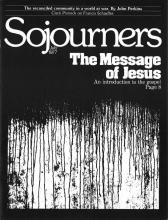"Serve your country, kill a priest” was the advice given recently in leaflets distributed in wealthy residential areas of
General Romero, the declared winner of the February 20 presidential elections despite allegations of fraud, reportedly intends to expel from the country every Jesuit by July 1, the date of his inauguration. Government actions since the election strongly suggest that President-elect Romero may not only live up to that promise, but that he and the current president, Arturo Armando Molina, may also end up violating the human rights of hundreds, possibly thousands, of Salvadoran citizens.
The Roman Catholic Bishops of El Salvador, formerly noted for their conservatism, have done a dramatic about-face in their view of the military government. Led by Archbishop Oscar Romero, their Conference made a strong statement on violations of human rights in their March 5 “Pastoral Message.” The church leadership denounced all forms of violence by both private paramilitary groups and government forces, torture, arbitrary deportation of priests and violations of human rights in general.
In a May 22 statement, the Catholic Bishops formally accused the military government of “persecution of the church … in the name of the struggle against atheistic communism.” This confrontation by the Church is the strongest challenge which the military government has had to face since the February 20 Presidential elections.
Read the Full Article

